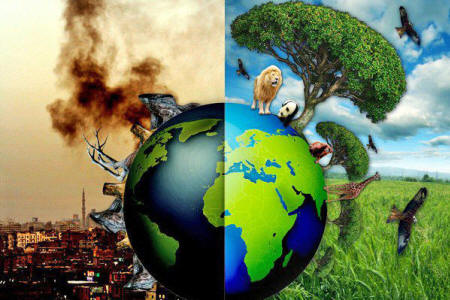|
by Arjun Walia
A new study (Accelerated Modern Human-Induced Species Losses - Entering the Sixth Mass Extinction) was led by the University of California-Berkeley, Stanford, and Princeton published last week in the journal Science Advance claims that the Earth has entered its sixth mass extinction phase, emphasizing that our time to avoid serious consequences is rapidly running out.
While so many of us are caught up in our daily lives - going to school, making money, and taking care of our families - or just trying to survive, there are several matters that relate to the well-being of our planet and everyone on it that continue to go overlooked.
These are serious issues that deserve our attention, and thankfully, more and more people are starting to take notice and look at what's really happening on planet Earth.
We are starting to observe, to question, and to raise our voice in order to emphasize our desire for change.
The current state of the world is troubling, and it clearly does not have to be this way. It's time for the human race to recognize its tremendous power and potential to create positive change.
It's not hard to believe; even if we take a look at what has happened just within the past couple of years, ...etc., along with everything that has happened over the past 100 years, it's almost unbelievable that we are still here.
If you think everything is okay, think again...
Things need to change, and it can be a fearful and depressing realization - one which we'd rather not acknowledge. Ignorance is bliss, so they say, but that attitude will only contribute to the degradation of our planet.
The knowledge that the Earth needs help can also be invigorating and uplifting. It can give us a deeper sense of purpose or connectedness with all life. Sometimes we have to go through these dark realizations in order to emerge on the other side as an even greater version of ourselves.
Whichever you prefer, collectively ignoring these issues is definitely not the answer; before we do something about it we first have to acknowledge it.
The study outlines how vertebrates are disappearing at a rate 114 times quicker than normal. These include mammals, birds, reptiles, amphibians, and fish.
What's the cause? There are several.
For example, an acre of land is cleared every second to graze animals and grow their food crops. As a result, over one hundred plant, animal, and insect species are lost.
The study outlined,
...as the main culprits.
Below is the documentary "Cowspiracy":
Official Trailer
or...
Another alarming point outlined in the study is the fact that the number of vertebrate species that have gone extinct in the last century would normally have taken 800 to 10,000 years to disappear, according to natural extinction rates.
The study also mentioned that the benefits of pollination by bees could be lost within just three human generations.
The disappearance of bees has been linked to the spraying of pesticides and herbicides.
This is alarming, what are we doing here on planet Earth?
Why are we continuing to do it despite the fact that we know it is destroying massive amounts of life?
This isn't the only study to raise such concerns.
A report published by Duke University just last year emphasized how plant and animal extinctions are happening at a rate one thousand times greater than before humans walked the Earth.
It was published in the journal Science.
We Still Have a Window of OpportunityAll is Not Lost and Great Progress is Being Made
Being directly involved in a "change-maker" movement myself for a number of years and having simply taken the time to pay attention to what is happening on our planet for even longer, I am still amazed at how much progress we've made.
Perhaps that's why I'm still optimistic for our future. I've seen the change myself in ways that may not be obvious to people working outside this industry.
One great example is genetically modified foods (GMOs).
A few years ago, if you told someone that there was a tremendous amount of published research and information suggesting that GMOs are harmful to the environment and human health, they might have called you a "conspiracy theorist," but today, thanks to activism and awareness, GMOs and the pesticides that go with them are now banned in multiple countries, or have severe restrictions on them.
More than 60 countries now require mandatory GMO labeling.
This is one of many examples where I've seen positive change in an area dominated by powerful corporations - an area where change seemed impossible. Yes, we still have a long way to go, but again, the window of opportunity is still open and we do still have time to change the way we do things here on planet Earth.
From economics and energy, to finance, health, and education, we have the potential to create an experience where all life can thrive without us having to destroy our planet.
|




